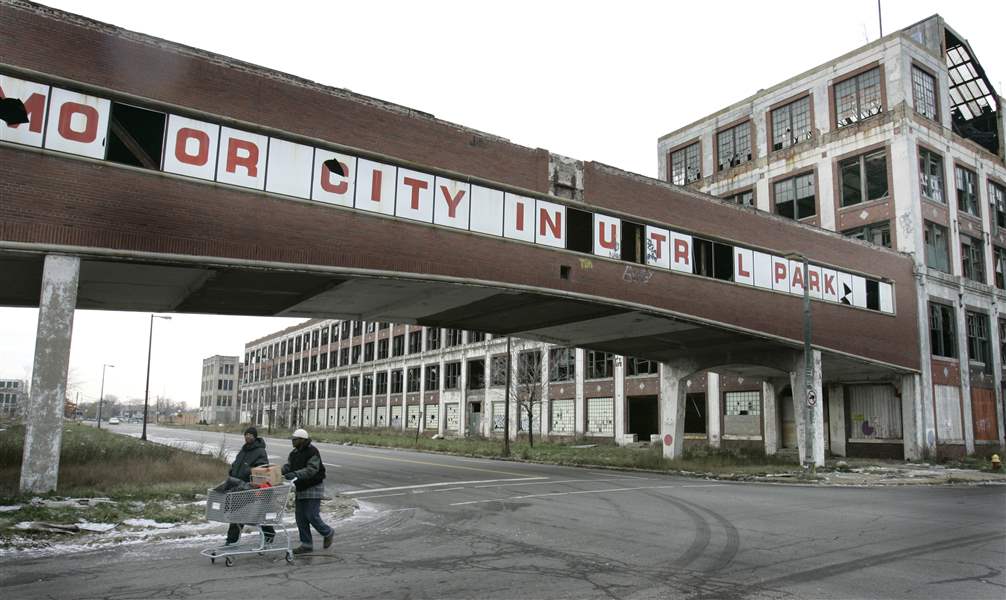
Author chronicles Detroit as epicenter of economic crisis
7/6/2013
Associated Press
Frozen corpses in abandoned buildings, corrupted leaders in city hall, ill-equipped fire and police departments, skyrocketing jobless rates, federal bailouts of the auto industry— welcome to Detroit, 21st Century.
If you’re not hooked on the mean-street opening pages of Charlie LeDuff’s Detroit: An American Autopsy, maybe you were asleep for the past decade or so, because America had an economic trauma in 2008 and Motown was at the heart of it.
Toledo, another hardscrabble town, always has looked up to Detroit in big-brother admiration. And that’s what makes Detroit a worthwhile read as the Motor City has been headline news at just about every turn and will continue to be with bankruptcy on the horizon.

LeDuff, a former reporter for the New York Times and Detroit News and current TV reporter for Fox 2 News in Detroit, wrote the book as part investigation and part memoir, with former mayor Kwame Kilpatrick’s downfall sharing the same pages as LeDuff’s drug-dealing brother and runaway sister.
The marriage of the two styles had the potential to fall flat, but LeDuff’s prose didn’t fail his hometown: “Once the nation’s richest big city, Detroit is now its poorest. It’s the country’s illiteracy and dropout capital, where children must leave their books at school and bring toilet paper from home. It is the unemployment capital, where half the adult population does not work at a consistent job. There are firemen with no boots, cops with no cars, teachers with no pencils, city council members with telephones tapped by the FBI, and too many grandmothers with no tears left to give. But Detroit can no longer be ignored, because what happened here is happening out there.”
LeDuff, 47, said in a recent phone interview that he didn’t set out to write Detroit when he first moved back to the city after working for the New York Times and writing two previous nonfiction books, US Guys: The True and Twisted Mind of the American Man and Work and Other Sins: Life in New York City and Thereabouts.
“I was just doing it. You keep notes as a journalist; things just started to reveal themselves,” said LeDuff, who was raised in Westland, a blue-collar town that abuts Livonia and Dearborn Heights. “When you grow up in a place, you’re not really told the history, nor are you very interested in it. But if you leave and you come back and [you’re a reporter], it was sort of an awakening, and I felt compelled to write it.”
While writing the book, LeDuff said he not only rediscovered Detroit but also things he didn’t know about his family lineage.
“I didn’t know I was [part] black. I didn’t know black people were barred from owning property, I didn’t know one of my great grandfathers was a founder of the place,” he said. “I didn’t know anything. And I started to learn it. And then I saw the consequence of the culture right in front of my face playing out in real time not in a nice way.”
What LeDuff witnessed was the economic meltdown of 2008. He calls Detroit the epicenter of the crisis, with Toledo not too far behind.
“If you’re a reporter, here is where you want to be,” he said. “This is the story, the one that you’re good at. I wanted to go right to the heart of it. I really believe that’s where we live. If Detroit, and if [Toledo] is our brother, if we were the epicenter and this is what happened, what does that really say underneath the credit default swaps, the inflated mortgages, and the tanning salons, what does that really say about the future of the country? It’s worth being here.”
LeDuff, who majored in political science at the University of Michigan, says what happened in the Rust Belt is happening in Los Angeles and Atlanta, but maybe not as bad as Detroit because “we do it spectacularly, but they’re getting theirs too.”
LeDuff isn’t convinced the United States has escaped the crisis altogether and there could be a sequel, but he’s optimistic about the future.
“I think the money’s [bogus], these new jobs are [bogus], he said. “We lost 800,000 jobs in Michigan in 10 years. Most of them were manufacturing. We replaced a quarter of them and most of them aren’t manufacturing. I’m worried.
“I believe we’re digging our way out. Our auto companies are profitable, although the factories aren’t really here anymore — the white-collar jobs are. The feds are helping us with our political corruption, the state is helping us with our books, you know, our money. I think we’re situated.”
LeDuff said when he started writing the book, he wanted to leave a document for his daughter about his family, about where they were all from and that’s something he took pride in and changed him as a person.
“I love my family. I want them to be remembered and considered,” he said. “Who do I know better? If you’re going to write a book about deep feelings, and people, and their history, who better then your brothers, and your ma, and your sister? This is a real book about the place. This is my feeling about it. It was the most honest book I could do.”
Contact Bob Cunningham at bcunningham@theblade.com or 419-724-6506.